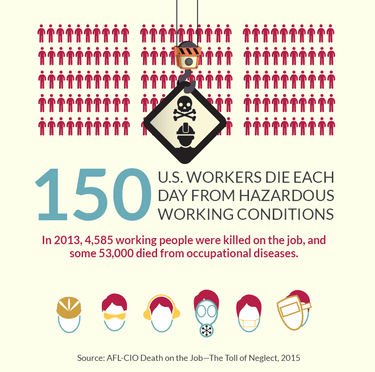Today’s post comes from guest author Rod Rehm, from Rehm, Bennett & Moore.
The AFL-CIO’s annual report about “the state of safety and health protections for America’s workers” has been written about in a previous year on this blog. The recently released 2015 version focuses in an in-depth manner on data from 2013 and includes around 200 pages of text, tables, details and information, along with a bit of jargon.
The report is extremely informative, and Nebraska and Iowa’s numbers will be examined in more detail in future blog posts, as these are states where the firm’s attorneys are licensed.
The report can also feel overwhelming once a person processes through the fact the each numeral on each chart represents the death of one person due to the workplace. There is also a ripple effect, as each person represented here had loved ones who both cared about and relied on that person. And for many involved, their lives changed drastically when their loved one died.
I appreciate the work, funding, thoughtfulness and effort put into compiling and analyzing the data, which includes a methodology section at the end of the report.
Here’s some sobering information from the summary.
“In 2013, 4,585 workers were killed on the job in the United States, and an estimated 50,000 died from occupational diseases, resulting in a loss of 150 workers each day from hazardous working conditions.
“Nearly 3.8 million work-related injuries and illnesses were reported, but many injuries are not reported. The true toll is likely two to three times greater, or 7.6 million to 11.4 million injuries each year.”
States with the highest fatality rate in the nation include a couple of relative neighbors: North Dakota and Wyoming. West Virginia, Alaska and New Mexico round out the top five. Lowest state fatality rates in 2013 were Hawaii, Washington, Connecticut and Massachusetts (tied) and New York and Rhode Island (tied).
Please contact an experienced workers’ compensation lawyer if you or a loved one is hurt on the job or has questions about job safety.


